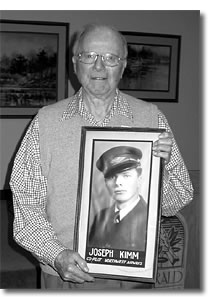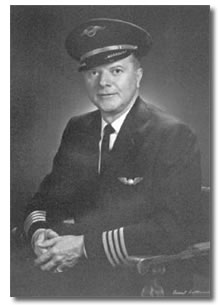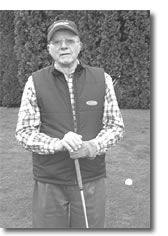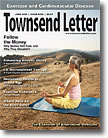We all have a few patients who have not
only done very well by our care, but also have made us remember
why we decided to become doctors. These folks would hardly change
the graphs in double-blind studies and probably wouldn't convince
a skeptical medical board. Still, there is something to be said
about the patient who not only does well with alternative medicine
but also lives a life that proves it.
 My patient is Joe Kimm, Sr. He will turn 97 this summer. Joe told
me that winter was tough this year because he was not able to snow-ski
– his love for the last 40 years was skiing at Washington
State's Stevens Pass. He gave up skiing when he turned 94. He looks
forward to the spring because he is able to get back to his golf
game. Several years ago, he studied new golf techniques, and he
proudly informed me that his golf game improved immeasurably. Given
the fact that he has been golfing for over four decades, Joe's comment
gives one pause over the maxim that "you can't teach an old
dog new tricks." Joe tells me that he doesn't have much to
do at 96, but he still delivers "meals-on-wheels," to
deserving seniors, and he is the active treasurer for his retirement
community. He is in charge of keeping the books, itemizing the accounts,
and making the deposits for the community's four shops and clubs.
My patient is Joe Kimm, Sr. He will turn 97 this summer. Joe told
me that winter was tough this year because he was not able to snow-ski
– his love for the last 40 years was skiing at Washington
State's Stevens Pass. He gave up skiing when he turned 94. He looks
forward to the spring because he is able to get back to his golf
game. Several years ago, he studied new golf techniques, and he
proudly informed me that his golf game improved immeasurably. Given
the fact that he has been golfing for over four decades, Joe's comment
gives one pause over the maxim that "you can't teach an old
dog new tricks." Joe tells me that he doesn't have much to
do at 96, but he still delivers "meals-on-wheels," to
deserving seniors, and he is the active treasurer for his retirement
community. He is in charge of keeping the books, itemizing the accounts,
and making the deposits for the community's four shops and clubs.
 Joe
started flying in the late 1920s for an infant airline industry.
In the old days, flight school was pretty primitive. There were
no computers or electronics – you kept the plane afloat and
on course by pulling on the yoke and manually raising and lowering
elevator levers. Joe's career with Northwest Airlines had its close
calls. He learned a lot from looking over the mistakes of many of
his friends who didn't fare so well piloting. At 60, he was looking
forward to learning the ins-and-outs of the Boeing 747, but the
airline didn't want to fund expensive training for an older pilot.
So Joe retired and took up skiing, scuba diving, and golfing. Joe
started flying in the late 1920s for an infant airline industry.
In the old days, flight school was pretty primitive. There were
no computers or electronics – you kept the plane afloat and
on course by pulling on the yoke and manually raising and lowering
elevator levers. Joe's career with Northwest Airlines had its close
calls. He learned a lot from looking over the mistakes of many of
his friends who didn't fare so well piloting. At 60, he was looking
forward to learning the ins-and-outs of the Boeing 747, but the
airline didn't want to fund expensive training for an older pilot.
So Joe retired and took up skiing, scuba diving, and golfing.
Joe was not a health nut. He smoked two-and-a-half packs of cigarettes
daily for nearly 30 years, and he liked to cap his non-working nights
with several drinks. He realized at 48 years old that if he wanted
to retire healthy, he needed to clean up his act. It took him five
tries, but he finally quit smoking. He cut down and eventually quit
his drinking. He began to trim down his weight from 190, losing
20 pounds. And he started taking vitamins – and not just a
few vitamins – about 50 years ago. He also took up yoga and
developed a routine of stretching and exercising each morning for
20 minutes. His lifestyle change gave him the stamina and flexibility
to scuba dive through his 70s in the cold waters of the Puget Sound.
His biggest dive to 100 feet was challenging, but Joe likes the
stimulation of doing new activities and keeping physical.
At 81 years of age, Joe suffered his first major heart problem.
He developed shortness of breath, and on examination, he was found
to have 90% blockage in the major coronary artery, the left anterior
descending. He had an angioplasty, a dilation of the blood vessel,
but without a stent. Joe elected to come see me a short time after
this, wanting to look into chelation. He was on his own making this
decision – his MDs were not open to using chelation for circulatory
problems. Joe did receive 30 chelations during the first year I
saw him and remarked about his improved stamina, overall vitality,
and ability to engage in all his activities, including his beloved
skiing, which had been sidetracked when he first developed coronary
artery ischemia. His follow-up cardiac exams did not show any significant
improvement in the first year after having chelation. But in the
second year after having chelation, Joe's cardiac reserves, heart
muscle function, and coronary artery status had improved.
Some patients undergo the chelation process, do well or do not-so-well,
and move on. There's a protocol that suggests that 20-30 chelations
are necessary to remove toxic elements and improve circulation blood
flow. The protocol is not clear about what should be done after
those first 30 treatments are done. As a rule, most patients come
in periodically for "booster" chelation to maintain the
benefits of the initial chelation series. Joe elected to come in
for maintenance chelation and to continue having chelation on an
extended basis. After it became clear that his cardiac status was
improving based not only on his symptom response but also on the
results of cardiac studies, Joe decided that long-term chelation
maintenance would be incorporated into his health strategy. He continued
to follow a prudent diet, exercise, actively ski, and consume many
herbal and vitamin/mineral supplements.
Joe has continued seeing me and having chelation throughout his
80s and 90s. He has had a few rough spells in the last three years.
Each time, he has come in for an intensive chelation series of ten
or so chelation treatments given over a short time period. His primary
care physician has changed his viewpoint over the years regarding
the chelation process. Initially disbelieving its value, Joe's physician,
"Hank," is now convinced that it has been extremely helpful
for Joe.
 And perhaps this is the lesson for chelation and alternative medicine:
some treatments work awfully well for certain patients. Despite
the fact that some smaller studies did not find good results for
chelation, there are always a number of patients who not only respond
well, they usually respond spectacularly. How does medicine deal
with a treatment that yields mediocre and spectacular results? It
would be terrible to dismiss the treatment process because we don't
have a therapy that offers a typical bell-curve result pattern.
Medicine needs to acknowledge that alternative medicine works on
patients very differently from the dose/benefit pattern of a drug.
Alternative therapies appear to work on patients who are "conducive"
to responding to such treatments – this is not a placebo.
This is a patient engaging in a healing process and the healing
process engaging the patient. When there is a "marriage"
between a patient and healing process, it works; when there is no
"marriage," it doesn't. Hence, the absurdity that alternative
medicine must be reduced to "evidence-based" medicine.
Alternative medicine will always be the medicine that "matches"
what is right for the particular patient.
And perhaps this is the lesson for chelation and alternative medicine:
some treatments work awfully well for certain patients. Despite
the fact that some smaller studies did not find good results for
chelation, there are always a number of patients who not only respond
well, they usually respond spectacularly. How does medicine deal
with a treatment that yields mediocre and spectacular results? It
would be terrible to dismiss the treatment process because we don't
have a therapy that offers a typical bell-curve result pattern.
Medicine needs to acknowledge that alternative medicine works on
patients very differently from the dose/benefit pattern of a drug.
Alternative therapies appear to work on patients who are "conducive"
to responding to such treatments – this is not a placebo.
This is a patient engaging in a healing process and the healing
process engaging the patient. When there is a "marriage"
between a patient and healing process, it works; when there is no
"marriage," it doesn't. Hence, the absurdity that alternative
medicine must be reduced to "evidence-based" medicine.
Alternative medicine will always be the medicine that "matches"
what is right for the particular patient.
Joe recently returned to see me, because he suffered from a difficult
flu bug and he had become quite short of breath. He resumed having
chelation and is no longer suffering with the infection or breathing
difficulties. He looks forward to getting back on the golf course
this spring.
In this month's issue of the Townsend
Letter, Robert Crayhon interviews
Dr. John Abramson, MD, who discusses "The Overselling of 'Statins.'"
Crayhon's radio show "Nutritional Medicine Update" focuses
on interviewing the "big minds" in nutrition and integrative
medicine. His conversation with Dr. Abramson tackles a serious topic:
how effective are pharmaceutical drugs in preventing progressive
deterioration in heart disease? Over the past two years, the medical
profession has taken the unseemly position that elevated low density
lipoprotein (LDL) cholesterol scores require drug therapy until
proven otherwise. For the non-diabetic, an LDL score exceeding 100
mg% is considered high; for the diabetic, an LDL reading of more
than 70 mg% demands treatment. The quickest and most efficient prescription
dispensed in the clinic is a "statin." Until the Vytorin
quagmire earlier this year, one had little argument against the
prescribing of Lipitor or Zocor. Or so it would seem. Dr. Abramson
argues that the evidence on LDL cholesterol treatments reveals statins
may be useful in lowering cholesterol but are of little benefit
in reducing cardiac disease or mortality. Abramson posits that diet
and exercise remain the best treatment strategies for preventing
heart attack and that the evidence that statins "work"
are misinterpretations of the data.
Brian Peskin, with Dr. David Sim, examines the Vytorin failure and
presents a compelling argument to reconsider LDL's role in the development
of cardiac disease. Peskin, an electrical engineer, and Dr. Sim,
a cardiologist, theorized in a paper published in the August/September
2007 Townsend Letter
that essential fatty acids play a fundamental role in preventing
cancer. Peskin's theory argued that the dietary consumption of esterified
and adulterated fats obstructs the effective oxygenation of cells,
facilitating cancer metabolism. In their article in this issue,
Peskin and Sim worry that the statin degradation of LDL cholesterol
interferes with the body's innate mechanisms to remove esterified
fats and diminishes the productions of prostaglandins necessary
to prevent abnormal clotting. Peskin also worries that our excess
consumption of essential fatty acid derivatives found in fish oil
supplements disrupts the normal balance of "parent" "omega-6"
to "omega-3" essential oils. Peskin's work is controversial
but deserves study and consideration.
On the political side of things – no, I don't mean the debate
over Clinton and Obama – read Dr. Julian Whitaker, MD's guest
editorial on the misconduct of state medical boards. Whitaker takes
the position that medical boards have unbridled powers and their
investigations violate due process, pose conflicts of interest,
and breach privacy. He discusses a lawsuit against the Texas Medical
Board and encourages readership support.
Jonathan Collin, MD
|



![]()
![]()
![]()

 My patient is Joe Kimm, Sr. He will turn 97 this summer. Joe told
me that winter was tough this year because he was not able to snow-ski
– his love for the last 40 years was skiing at Washington
State's Stevens Pass. He gave up skiing when he turned 94. He looks
forward to the spring because he is able to get back to his golf
game. Several years ago, he studied new golf techniques, and he
proudly informed me that his golf game improved immeasurably. Given
the fact that he has been golfing for over four decades, Joe's comment
gives one pause over the maxim that "you can't teach an old
dog new tricks." Joe tells me that he doesn't have much to
do at 96, but he still delivers "meals-on-wheels," to
deserving seniors, and he is the active treasurer for his retirement
community. He is in charge of keeping the books, itemizing the accounts,
and making the deposits for the community's four shops and clubs.
My patient is Joe Kimm, Sr. He will turn 97 this summer. Joe told
me that winter was tough this year because he was not able to snow-ski
– his love for the last 40 years was skiing at Washington
State's Stevens Pass. He gave up skiing when he turned 94. He looks
forward to the spring because he is able to get back to his golf
game. Several years ago, he studied new golf techniques, and he
proudly informed me that his golf game improved immeasurably. Given
the fact that he has been golfing for over four decades, Joe's comment
gives one pause over the maxim that "you can't teach an old
dog new tricks." Joe tells me that he doesn't have much to
do at 96, but he still delivers "meals-on-wheels," to
deserving seniors, and he is the active treasurer for his retirement
community. He is in charge of keeping the books, itemizing the accounts,
and making the deposits for the community's four shops and clubs.
 Joe
started flying in the late 1920s for an infant airline industry.
In the old days, flight school was pretty primitive. There were
no computers or electronics – you kept the plane afloat and
on course by pulling on the yoke and manually raising and lowering
elevator levers. Joe's career with Northwest Airlines had its close
calls. He learned a lot from looking over the mistakes of many of
his friends who didn't fare so well piloting. At 60, he was looking
forward to learning the ins-and-outs of the Boeing 747, but the
airline didn't want to fund expensive training for an older pilot.
So Joe retired and took up skiing, scuba diving, and golfing.
Joe
started flying in the late 1920s for an infant airline industry.
In the old days, flight school was pretty primitive. There were
no computers or electronics – you kept the plane afloat and
on course by pulling on the yoke and manually raising and lowering
elevator levers. Joe's career with Northwest Airlines had its close
calls. He learned a lot from looking over the mistakes of many of
his friends who didn't fare so well piloting. At 60, he was looking
forward to learning the ins-and-outs of the Boeing 747, but the
airline didn't want to fund expensive training for an older pilot.
So Joe retired and took up skiing, scuba diving, and golfing.  And perhaps this is the lesson for chelation and alternative medicine:
some treatments work awfully well for certain patients. Despite
the fact that some smaller studies did not find good results for
chelation, there are always a number of patients who not only respond
well, they usually respond spectacularly. How does medicine deal
with a treatment that yields mediocre and spectacular results? It
would be terrible to dismiss the treatment process because we don't
have a therapy that offers a typical bell-curve result pattern.
Medicine needs to acknowledge that alternative medicine works on
patients very differently from the dose/benefit pattern of a drug.
Alternative therapies appear to work on patients who are "conducive"
to responding to such treatments – this is not a placebo.
This is a patient engaging in a healing process and the healing
process engaging the patient. When there is a "marriage"
between a patient and healing process, it works; when there is no
"marriage," it doesn't. Hence, the absurdity that alternative
medicine must be reduced to "evidence-based" medicine.
Alternative medicine will always be the medicine that "matches"
what is right for the particular patient.
And perhaps this is the lesson for chelation and alternative medicine:
some treatments work awfully well for certain patients. Despite
the fact that some smaller studies did not find good results for
chelation, there are always a number of patients who not only respond
well, they usually respond spectacularly. How does medicine deal
with a treatment that yields mediocre and spectacular results? It
would be terrible to dismiss the treatment process because we don't
have a therapy that offers a typical bell-curve result pattern.
Medicine needs to acknowledge that alternative medicine works on
patients very differently from the dose/benefit pattern of a drug.
Alternative therapies appear to work on patients who are "conducive"
to responding to such treatments – this is not a placebo.
This is a patient engaging in a healing process and the healing
process engaging the patient. When there is a "marriage"
between a patient and healing process, it works; when there is no
"marriage," it doesn't. Hence, the absurdity that alternative
medicine must be reduced to "evidence-based" medicine.
Alternative medicine will always be the medicine that "matches"
what is right for the particular patient. 